7. Oceania
The Pacific island countries are not only Japan’s “neighbors” which share the Pacific Ocean, but also have historical ties to Japan. Having an enormous Exclusive Economic Zone (EEZ), these countries are the cornerstone of Japan’s maritime transport, and they provide important pelagic fishing grounds. Therefore, the peace and prosperity of the Pacific island countries are important to Japan.
Meanwhile, many of the Pacific island countries are newly independent states, and it is urgently necessary for them to establish economical self-reliance. In addition, there are common problems that are specific to small island countries, such as their small economies being dependent on primary industries, their territories being broadly stretched across the sea, difficulty of access to the international market, vulnerability to natural disaster and the risk of land loss because of rising sea-levels. Based on this situation, Japan, as a good partner committed to the Pacific island countries, provides assistance for supporting their self-reliant and sustainable development.
< Japan’s Efforts >
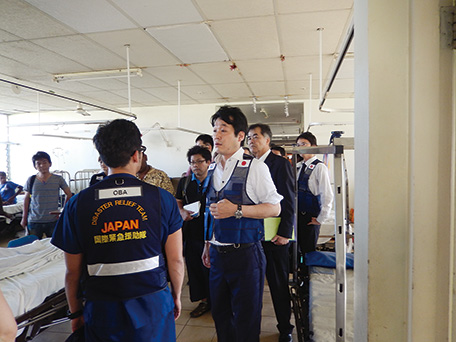
Then Parliamentary Vice-Minister for Foreign Affairs Kentaro Sonoura visits the capital of Vanuatu, Port Villa, which suffered severe damage caused by Cyclone Pam, and provides encouragement to the Japan Disaster Relief (JDR) medical team, in March 2015.
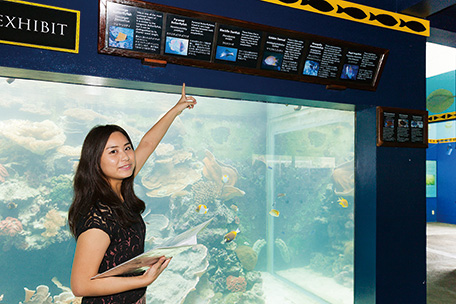
A Japan Overseas Cooperation Volunteer, Ms. Yuka Yamagami works at the Palau Coral Reef Center. (Photo: Kaku Suzuki / JICA)
To achieve political stability and self-reliant economic development in the Pacific island countries, it is crucial to overcome socio-economic vulnerabilities and to provide cooperation for the entire region. In addition to promoting cooperation with the Pacific Islands Forum (PIF),(Note 11) a framework for regional cooperation composed of the Pacific island countries, Japan hosts the Pacific Islands Leaders Meeting (PALM), the summit meeting between Japan and the Pacific island countries every three years since 1997.
At PALM7 held in Iwaki City, Fukushima Prefecture in May 2015, based on the theme of “We are Islanders: Commitment to the Pacific from Iwaki, Fukushima: Building Prosperous Future Together,” Japan announced cooperation intending to promote interactive partnerships between Japan and Pacific island countries with a focus on the following seven areas: (i) disaster risk reduction; (ii) climate change; (iii) environment; (iv) people-to-people exchanges; (v) sustainable development; (vi) oceans, maritime issues and fisheries; and (vii) trade, investment and tourism. Japan committed to providing assistance of more than ¥55 billion as well as to reaching out to 4,000 people through human resources development and people-to-people exchanges in the next three years.
Based on the assistance package announced at PALM, Japan is implementing bilateral cooperation, including developing basic infrastructures such as ports, along with region-wide cooperation spread across several countries. For “disaster risk reduction,” one of the priority areas of cooperation, Japan is extending comprehensive assistance for building disaster-resilient societies in Pacific island countries, drawing on Japan’s expertise, such as training meteorological agency personnel from each country and developing appropriate evacuation systems for its residents.
In addition, to support the Pacific island countries in addressing climate change issues, Japan partners with the Secretariat of the Pacific Regional Environment Programme (SPREP), a regional organization in Samoa, to work on activities to train personnel engaged in measures countering climate change in their countries.
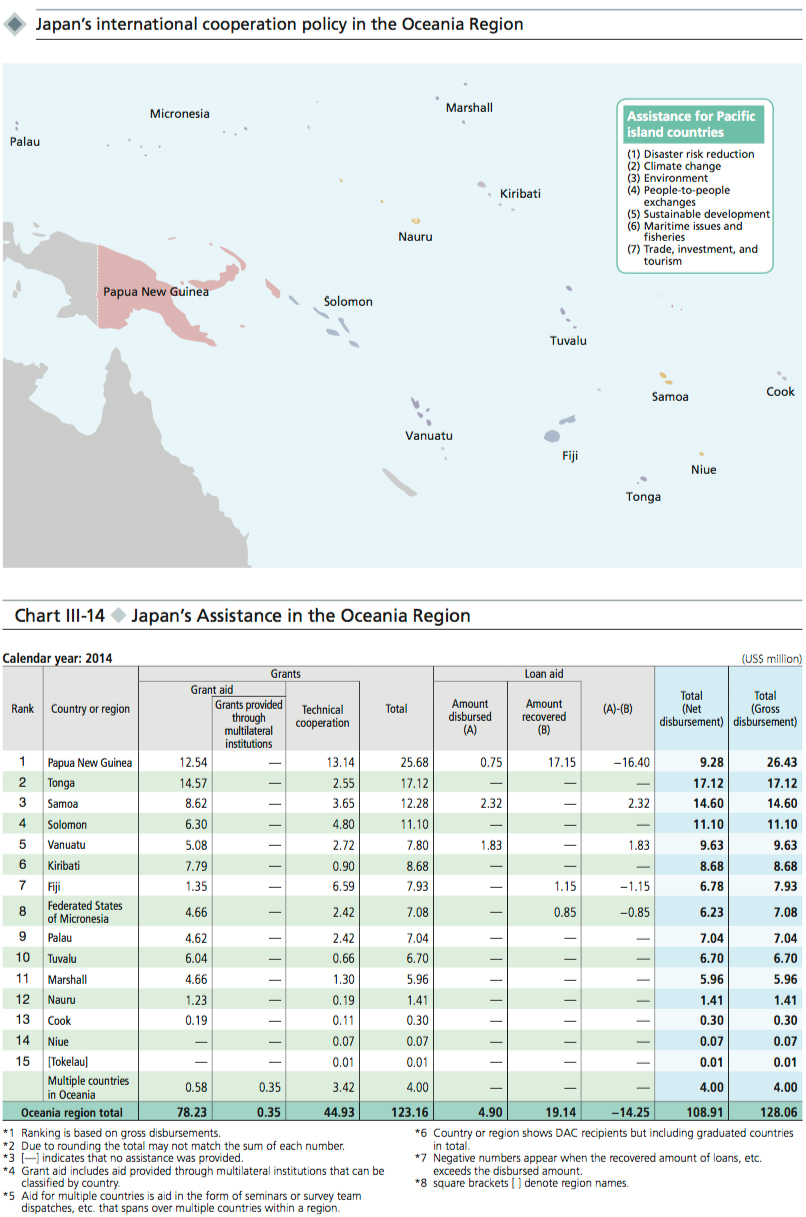
- Note 11: PIF members: Australia, Cook, Federated States of Micronesia, Fiji, Kiribati, Marshall, Nauru, New Zealand, Niue, Palau, Papua New Guinea, Samoa, Solomon, Tuvalu, Tonga, and Vanuatu
Pacific Island Countries (14 countries)
Japanese Technical Cooperation Project for Promotion of Regional Initiative on Solid Waste Management
Technical Cooperation Project (February 2011 – Ongoing)
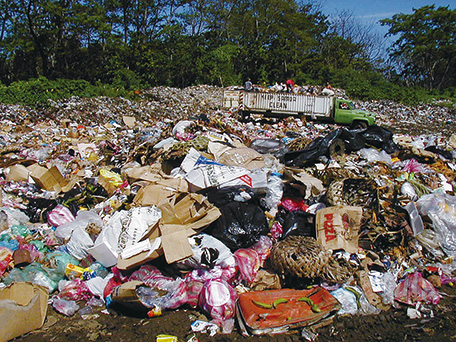
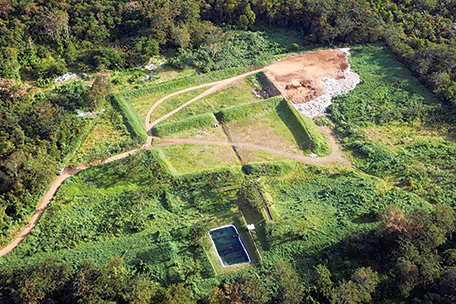
A waste disposal site in Samoa improved beyond recognition. (The top photo was taken before the improvement took place, and the bottom - after it was completed.) (Photos: JICA)
In the past, Pacific Islanders used to make a living with the natural materials found on the islands they inhabited. However, as modernization and globalization have advanced in recent years, they now mostly consume products imported from abroad.
Beverages in PET bottles, glass bottles and aluminum cans are imported by Pacific Island countries. Once the contents are consumed, all bottles and cans become solid waste in these countries. As all Pacific Island countries have limited land space, solid waste is often dumped in the environment, causing harm to coral reefs and other important parts of the local ecosystem.
The Government of Japan proposed the Pacific Regional Solid Waste Management Strategy 2010-2015 at the 2nd Pacific Islands Leaders Meeting in 2000. Japan has cooperated with Pacific Island countries to address solid waste issues ever since.
Specifically, the initiatives have focused on promoting the 3Rs (“reduce, reuse and recycle” waste, such as used PET bottles, glass bottles, aluminum cans). They are modeled on the successful solid waste reduction and recycling efforts implemented by Shibushi City in Kagoshima Prefecture.
Besides the 3Rs, sound waste management is also important. Solid waste, once buried without any treatment, contaminates soil and groundwater, which seriously affects people’s lives and the environment. Japan has dispatched a number of experts and provided equipment to Pacific Island countries, for improving landfill sites and capacity-building for those who develop waste management strategies. Japan continues to make its best efforts to prevent the aggravation of environmental pollution in those countries.
Solid waste must be disposed of properly in Pacific Island countries. Otherwise, the natural environment of the Pacific could be destroyed. This may also affect Japan, as a fellow Pacific Island country.
The waste management system in Pacific Island countries is expected to become further self-sustained and progressive, to which Japan has also contributed its share. It will also enable us to conserve their precious environment. (As of August 2015)
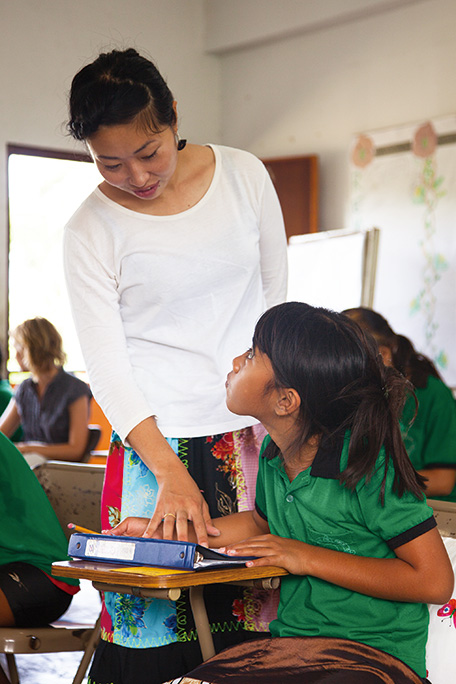
A Japan Overseas Cooperation Volunteer (primary school teacher), Ms. Tomoko Mitsuhashi combines math classes with classes for promotion of local foods in Pohnpei, the Federated States of Micronesia. (Photo: Miki Tokairin / JICA)
